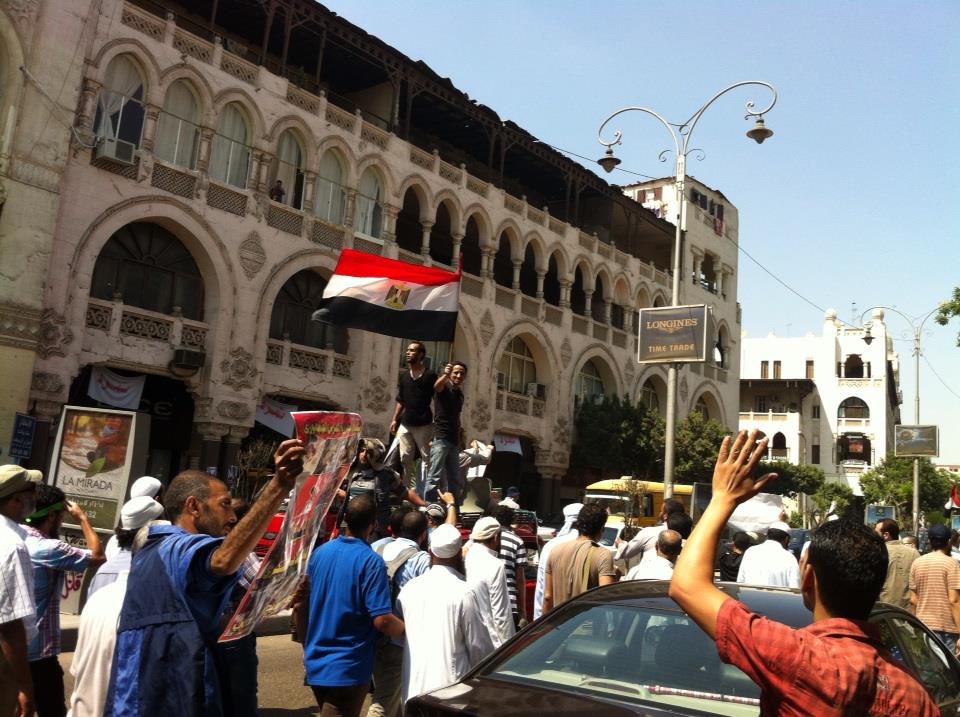Latest NEWS
- Aswat Masriya, the last word
- Roundup of Egypt's press headlines on March 15, 2017
- Roundup of Egypt's press headlines on March 14, 2017
- Former Egyptian President Hosni Mubarak to be released: lawyer
- Roundup of Egypt's press headlines on March 13, 2017
- Egypt's capital set to grow by half a million in 2017
- Egypt's wheat reserves to double with start of harvest -supply min
- Roundup of Egypt's press headlines on March 12, 2017
Anti-army protests staged at Egyptian universities

Pro-Mursi demonstrations march in the Korba area near the presidential palace in Cairo on July 12, 2013 - Aswat Masriya
By Maggie Fick
CAIRO, Oct 8 (Reuters) - Hundreds of Muslim Brotherhood supporters chanted "Down with the military government" outside Cairo University on Tuesday, defying Egypt's army-backed authorities despite deadly clashes with security forces two days earlier.
Supporters of deposed President Mohamed Mursi had urged university students to protest against the army following the violence on Sunday, one of the Egypt's bloodiest days since the military ousted the Islamist leader on July 3.
The death toll from Sunday's unrest rose to 57, state media said, with 391 people wounded.
The Muslim Brotherhood has accused the army of staging a coup and working with security forces to eliminate the group through violence and arrests, allegations the military denies.
"We are here standing against the coup," said Enas Madkour, a 19-year-old fine arts student at the march near Cairo University, where security forces had parked two tanks and blocked the main road with barbed wire.
"I'm against Mursi but I'm not for people killing others and I'm not for the military government we have now," said Madkour, who wore a headscarf, as most Muslim women do in Egypt.
Security forces detained 35 people in the area, security sources said.
Small-scale protests also occurred at Helwan University in southern Cairo, witnesses said. At Zagazig University, north east of Cairo, pro-Brotherhood students clashed with residents and Brotherhood opponents with fists, sticks and stones, security sources said, and eight people were wounded.
Authorities have cracked down on the Brotherhood in recent weeks. Security forces killed hundreds of pro-Mursi protesters in Cairo in August and then arrested many Brotherhood leaders.
NGO REGISTRATION REVOKED
On Tuesday, the government revoked the registration of a non-governmental organisation set up by the Brotherhood in March to enable it to operate legally.
Last month, a court banned the Brotherhood and froze its assets, pushing the group, which had dominatd elections held in Egypt after Mubarak's fall in 2011, further into the cold. A court is due to hear an appeal on Oct. 22 against the decision.
PROTECTING TOURIST SITES
Along with political turmoil, a surge in militant attacks has hammered tourism, a main foreign currency earner, amid fears it is no longer safe to visit Egypt's pyramids and beaches.
Hours after gunmen killed a police officer and wounded another in the Suez Canal city of Port Said on Tuesday, the interior ministry said Egypt may install security cameras at tourist sites to deter militants from targeting visitors.
"There's a security plan in place in tourist areas that will maintain stability in these areas," Interior Ministry spokesman Hany Abdel Latif said. "We expected all these problems because we are in a war against terrorism."
Al Qaeda-inspired militants have attacked police and soldiers almost daily in the Sinai Peninsula since Mursi fell.
The assaults are the most sustained since an Islamist insurgency that was crushed by then-President Hosni Mubarak in the 1990s, when militants killed tourists, government officials and policemen. A total of about 1,200 people died on both sides.
Tourism earned Egypt $9.75 billion in the 2012-13 fiscal year, compared with $11.6 billion in 2009-10.
The economy is expected to grow by 2.6 percent in the fiscal year ending June 2014, according to a Reuters poll this month, well below the 3.5 percent the government expects to achieve.
Egypt's economy grew about 7 percent annually for several years before the 2011 uprising that toppled Mubarak.
Attacks by militants in the Sinai have killed more than 100 soldiers and police since early July, the army said on Sept. 15.
Last month the interior minister survived an assassination attempt in Cairo.
Though the Brotherhood, which renounced violence decades ago, has been weakened, Islamist groups which sympathise with it show no signs of giving up protests against Mursi's ouster.
With Egypt's oldest and best organised Islamist movement now effectively excluded from mainstream politics, the stage may be set for an insurgency to take hold beyond the Sinai, a stronghold for militants which is near the border with Israel.
On Monday, suspected militants killed six Egyptian soldiers near the Suez Canal, a global trade lane, and fired rocket-propelled grenades at a state satellite station in Cairo.
The al-Furqan group claimed responsibility for the grenade attack in an Internet video whose authenticity could not be immediately verified.
(Writing by Michael Georgy and Yara Bayoumy; Editing by Alistair Lyon)










